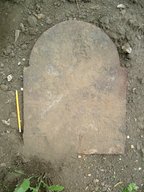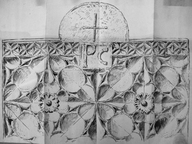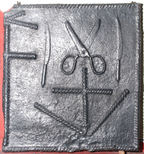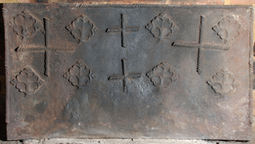-
15
Description: Arched rectangular shape; no edging.
Notes: The plain form suggests a common source with firebacks cast at Ashburnham in 1813. One of a small series of firebacks cast in the early-19th century for farms on the Ashburnham estate.
- Decoration tags:
- rectangular with round arch (shape)
- none (edging)
Manufactured: in the early-19th century probably at Ashburnham Furnace in the Weald area of England.
Current location: in private hands, Ashburnham, East Sussex, England.
- Attached to series:
- Ashburnham late series
- Base boards
-
1083
Description: Arched rectangular shape; fillet edging (top and sides); twisted rope cross in centre of arch; fillet-edged square below arch containing initials of uneven size; along the top, a line of five quatrefoils on each side of the initials; below, two symmetrically carved roundels and associated spandrels, each with a central flower.
Notes: The quatrefoils and roundels are likely to have been part of a redundant, probably medieval, furniture panel, perhaps from a chest. The life-size rubbing, reinforced with ink, is by W. R. Lethaby. The fireback was formerly property of the artist John Callcott Horsley RA (1817-1903) at Wilsley Green, Cranbrook, Kent.
Inscription: PC
- Decoration tags:
- rectangular with round arch (shape)
- fillet (edging)
- carved pattern panels
- apotropaic
- text
- objects
Manufactured: in the mid- to late-16th century possibly in the Weald area of England.
Current location: Victoria & Albert Museum, Cromwell Road, Kensington & Chelsea, London, England.
Museum number: 3267-1932 (part of the Victoria & Albert Museum museum group)
Citation: Lethaby, W. R., 1 Oct 1926, 'English Cast Iron - I', The Builder, 131, no. 4365, pp. 537-8.
- Attached to series:
- Miscellaneous pattern firebacks
-
385
Description: Rectangular with two-stepped top; plain plate; date across lower step; rope saltire in upper step; initials split below outer shoulders.
Notes: The distinctive hand-formed characters on this and some other stepped firebacks imply a common source. Although the talbot crest, by which other firebacks in the series are identified, is absent on this casting, the shape and the style of the characters places it incontrovertably in the same group. Formerly part of the J. H. Every collection.
Inscription: 1615 / R T
- Decoration tags:
- stepped (shape)
- none (edging)
- simple stamps
- individual letters
- individual numbers
- text
- objects
Manufactured: in 1615 in the Weald area of England.
Current location: Anne of Cleves House, Southover High Street, Lewes, East Sussex, England.
Museum number: 1944.24.050 (part of the Sussex Archaeological Society museum group)
Citation: Anon., 30 Dec 1911, 'Sussex Backs and their Story', The Ironmonger.
Citation: Hughes, G. B., 21 Apr 1955, 'Old English Firebacks', Country Life, 117, pp. 1056-60.
Citation: Hughes, G. B., May 1940, 'Old English Firebacks', Apollo, 31, 185, pp. 117-120.
- Attached to series:
- Stepped firebacks
- Talbot crest series
-
453
Description: Rectangular; twisted rope edging; irregular arrangement of three rope lengths at top left; rope cross above ‘V’ at middle bottom; impression of a pair of scissors between two impressions of a domestic table knife.
Notes: The knife is early-17th century in date or perhaps a bit earlier, just into Elizabeth I’s reign. The pommels date them from around this time and the long and narrow blades are right for the end of Elizabeth/early James I. The irregular rope lengths suggest this is probably part of a larger fireback.
- Decoration tags:
- rectangular (shape)
- rope (edging)
- simple stamps
- apotropaic
- objects
Manufactured: in the late-16th to early-17th century in the Weald area of England.
Current location: Anne of Cleves House, Southover High Street, Lewes, East Sussex, England.
Museum number: LH000.939 (part of the Sussex Archaeological Society museum group)
Citation: Moore, S., 1999, Cutlery for the Table (Sheffield, The Hallamshire Press).
-
846
Description: Rectangular; twisted rope edging (top and sides); floriated trefoil stamp repeated in two rows of four in the upper two-thirds of the plate; between the middle four stamps, two small crosses of twisted rope, one above the other; between each outer group of four stamps a large cross of twisted rope.
Notes: The floriated trefoils may have been derived from a metal ornament.
- Decoration tags:
- rectangular (shape)
- rope (edging)
- simple stamps
- apotropaic
- objects
Manufactured: in the mid- to late-16th century in the Weald area of England.
Current location: in private hands, Barcombe, East Sussex, England.
- Attached to series:
- Miscellaneous stamp firebacks
- Metalware stamp firebacks




